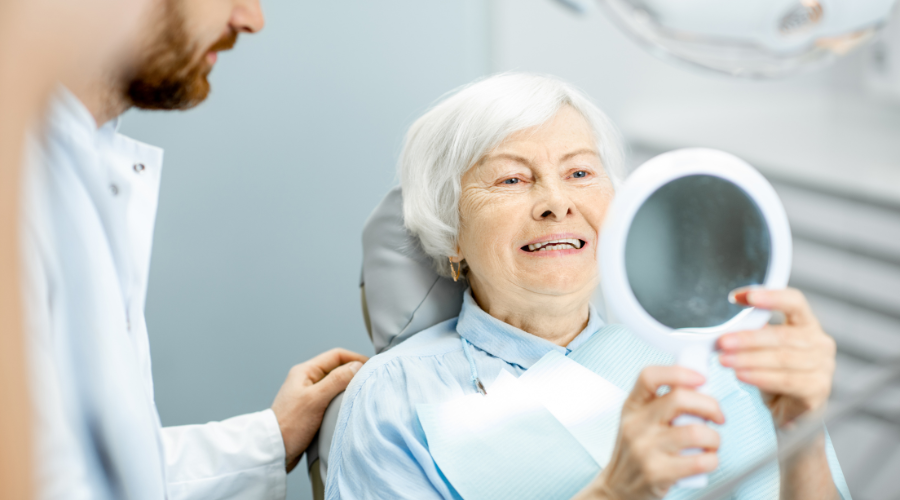What dental problems affect seniors?
A lifetime of eating and drinking foods and beverages that cause stains on the teeth can darken them. Changes in dentin are also caused by the thinning of the outer enamel layer that allows the darker yellower enamel to become visible. Darkened teeth may be a sign of health problems.
Dry mouth is caused by a reduction in the flow of saliva. Reduced saliva flow can be caused by a number of factors, such as cancer treatments that use radiation on the head or neck as well as medication side effects. Many medicines are known to cause dry mouth.
Seniors can also experience root decay. When the gums recede from the tooth, the tooth roots become exposed. Enamel works to protect the tooth roots; however, when the enamel wears away, the roots are no longer protected and are prone to decay (more so than the crown of the tooth).
Gum disease is common, especially among seniors. The problem is caused by plaque and worsened by food particles stuck in the teeth. Other causes of gum disease include tobacco usage, poor-fitting dentures, an unhealthy diet and diseases, like diabetes, anemia, and cancer.
While the abovementioned dental issues are prevalent in the aging population, caregivers can take steps to limit the extent of dental problems in elderly recipients and even help them improve their dental health. Following are specific oral health tips to help seniors maintain dental hygiene.
1. Receding Gums
Brushing too hard causes seniors’ gums to become inflamed, and this in turn causes the gums to recede. Caregivers are advised to purchase soft-bristled toothbrushes that fit the size of the senior’s mouth. Rather than scrub the teeth, older adults should apply gentle pressure while brushing.
2. Dry Mouth
More than one-quarter of patients aged 65 and older experience dry mouth. Taking four or more prescription medications, including blood pressure drugs, antidepressants, antihistamines, or anticholinergics, daily can lead to dry mouth in seniors. Parkinson’s and Alzheimer’s can also cause dry mouth.
Dry mouth can cause dental problems, such as cracked lips, fissured tongue (grooves on the sides of the tongue), and cavities. Saliva plays an important part in the prevention of gum and tooth diseases. Caregivers are urged to give their elderly care recipients plenty of daily hydration.
Seniors should sip or drink regular water throughout the day. Caregivers are advised to limit the elderly individual’s intake of sugary beverages, such as juices, sodas, and teas. Even serving sweetened coffee should be limited. Offer the senior sugar-free gum to promote the flow of saliva.
3. Bad Breath
Caregivers who help seniors with their morning and bedtime hygiene routines should be stocked with tongue scrapers. These inexpensive tools are designed to remove the layer of white gunk covering the tongue and that harbors the bacteria causing bad breath.
When a tongue scraper is not available, caregivers can instruct their care recipients to brush their tongue with a toothbrush. However, caregivers should be aware that chronic bad breath may be a sign of a serious problem, such as tooth decay.
4. Cavities
Untreated tooth decay is another common problem among people aged 65 and over. Dry mouth and receding gums contribute to this issue. Fluoride is the solution, as the ingredient has been proven to help protect seniors’ teeth against tooth decay.
Fluoride is found in numerous sources. Caregivers should look for toothpaste that contains fluoride and ensure the senior uses it when brushing. Fluoride rinses, available at drugstores, are also beneficial. The senior’s dentist can also apply a high-concentration prescription fluoride paste or varnish.
5. Bleeding Gums
Plaque buildup on the teeth can inflame the elderly individual’s gums, resulting in bleeding gums during brushing. While bleeding gums can indicate potential tooth loss, the inflammation can also increase the senior’s risk for disease, like Alzheimer’s and heart disease.
Caregivers should encourage the senior to brush at least twice per day for at least two minutes. Floss the older adult’s teeth at least once per day with ordinary floss or a small interdental brush. After cleaning their teeth, seniors should rinse with an antiseptic mouthwash.
A big part of maintaining good oral health in seniors is to schedule regular dental appointments. Professional cleanings from dentists will reduce the plaque buildup that causes inflammation. Dentists can detect cavities before they worsen and look for signs of infection or oral cancer.
Seniors who wear dentures can expect the dentist to ask them questions about when they wear the appliance and when they remove them. The dentist will look for irritation in areas where the dentures touch the mouth and examine the dentures for worn or broken areas.

Helping seniors maintain their oral health is just one responsibility caregivers from Assisting Hands Home Care perform. We also support seniors with the rest of their daily personal hygiene tasks, such as grooming, bathing, toileting, and dressing. Our home care service gives seniors valuable daily help.
Additional non-medical care services our dedicated caregivers provide include transportation to the dentist’s or doctor’s office, the preparation of nutritious meals, light housekeeping to ensure a hygienic home environment, timely medication reminders, fall risk assessments, and grocery shopping for fresh produce.
Assisting Hands Home Care services are flexible. We offer respite care, overnight care, and 24-hour care. Our professional caregivers are skilled in providing compassionate Alzheimer’s care, hospice care, and post-hospitalization care. Companion care keeps seniors socially active and less vulnerable to loneliness.
When your elderly loved one needs extra help, choose Assisting Hands Home Care. Our caregivers meet the senior’s care needs in the comfort of home. We offer quality home care to seniors in Deerfield, IL | Lake Zurich, IL | Lake Forest, IL | Lincolnshire, IL | Vernon Hills, IL | Highland Park, IL | Libertyville, IL | Round Lake Beach, IL, and the surrounding areas. Call us at (224) 268-9068 today to schedule an in-home consultation.
















